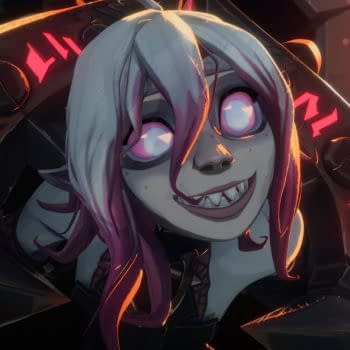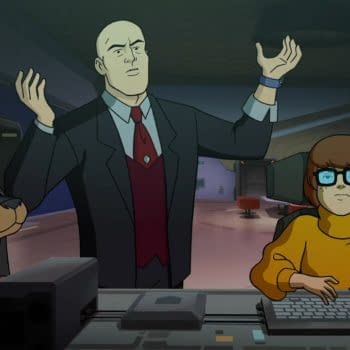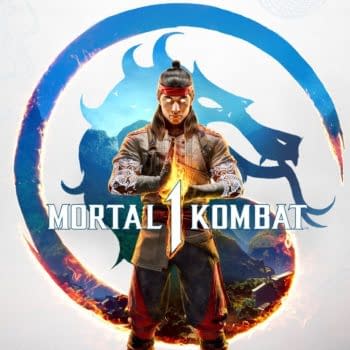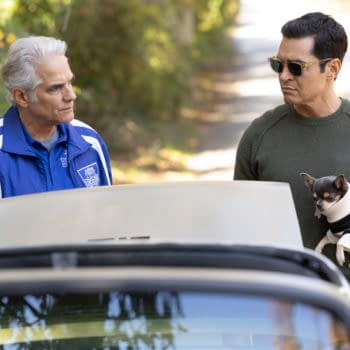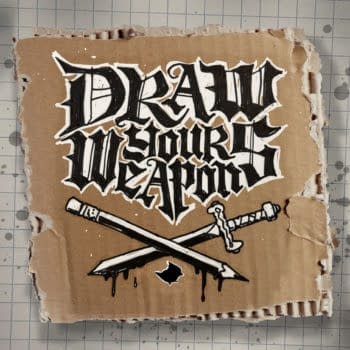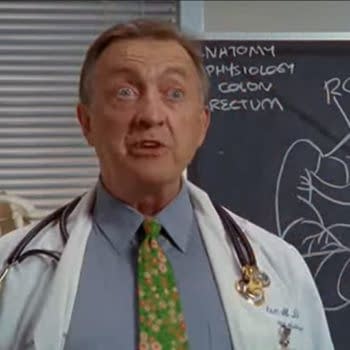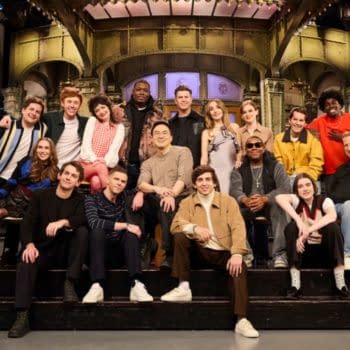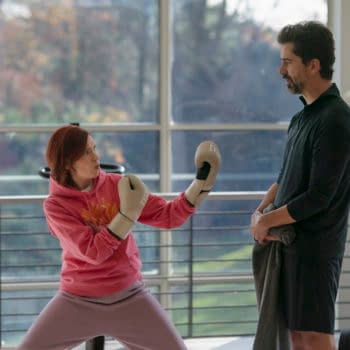Posted in: Netflix, Preview, streaming, Trailer, TV | Tagged: adventure time, cable, Duncan Trussell, interview, pendleton ward, podcast, preview, streaming, teaser, television, The Duncan Trussell Family Hour, the midnight gospel, trailer, tv
Duncan Trussell Discusses His Personal Journey to The Midnight Gospel
In a world quarantined during a global pandemic, April 20th (4/20 for you rubes) is the perfect time for Netflix's to launch The Midnight Gospel. The series, from co-creator Duncan Trussell (Curb Your Enthusiasm, Drunk History), is set in a virtually simulated universe using interview clips from Duncan's mind-bending podcast The Duncan Trussell Family Hour as it centers on Clancy (voiced by Trussell) a "space caster" dealing with a malfunctioning multiverse simulator. Seeking adventure and enlightenment Clancy leaves the comfort of his home to interview simulated beings surviving in dying worlds. Co-created with Pendleton Ward (Adventure Time), The Midnight Gospel feels to me like Fritz the Cat convinced Jake the Dog to drop some acid. And I loved it. Just after the nation was locked down due to the COVID 19 Pandemic, Trussell took some time to share his thoughts on the animated series, what he considers his incredible luck and his thoughts on the afterlife.
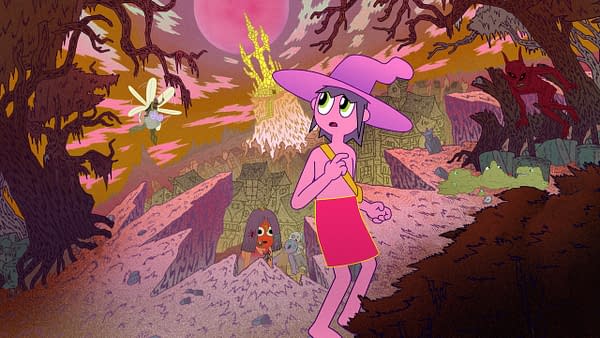
Duncan's podcast The Duncan Trussell Family Hour, featuring his fellow comedians, outsiders, spiritual healers, discussing topics like spirituality, consciousness, psychedelics, fringe theories, existentialism, and comedy is the foundation for the animated series, The Midnight Gospel. To create a cohesive story around the handpicked recordings Ducan called on some comic friends, a witch, an occult theorist, and even Weird Al came in for a writer summit held at an undisclosed location. The team was then challenged to come up with various ways that the world might end, and broke down apocalyptic scenarios into beats that Clancy, and the person that he is chatting with, could move through while they are talking. Following that, a storyboard artist would hang the dialog on top of that for the animation.
"Every day we would come up with a new, sort of "What would happen in a zombie apocalypse if the president was having to deal with that, or what would happen in a dystopian reality where a city was fueled by meat, and suddenly the meat stopped flowing. Or what would happen in a medieval world that was beginning to collapse because of some sort of connection to evil?"
Moving the Conversation From the Apocalypse to the Interpersonal
Very quickly the summit realized that people aren't necessarily going to be sitting around talking about the apocalypse, they would be having normal conversations. So, to differ from apocalyptic and movies about the collapse of civilization, they steered away from what everybody might be talking about- Zombies, water, weapons, vaccines- and focused on some interpersonal relationship stuff that would be going down.
"People are going to just have regular conversations no matter what, and so that's what we realized. At the end of the world, people are going to be talking about other things besides the end of the world. Like this, or like whatever. you find yourself in a conversation with your family, with your wife, about? At some point how much we are going to talk about COVID and the rate of transmission, and how does it spread? At some point, you're going to start playing Uno."
Duncan's mother, Deneen Fendig, peacefully passed on April 3, 2013. Incredibly, three weeks earlier she had the idea to sit and record a podcast with Duncan that would end up being the final and most powerful, perspective-altering episode of The Midnight Gospel. Since recording Duncan only listened to it once, just before his wedding. Without his mother existing in the physical realm, he was able to introduce her to his wife.
"I cannot watch that without crying and being sort of spellbound and awestruck by my mom sort of prescient when she decided that she wanted to do that because when she was dying it was kind of like I didn't want to have that conversation. Not because I didn't want to have the conversation I just didn't want to deal with the fact that this is probably going to be one of the last times I talked to my mom. So to me, it's just amazing. She was dying and she said "Why don't we do it? Let's do this, let's record a podcast. so we recorded it and, of course, then I had no idea that it would end up being an animated show on Netflix and go out to lots and lots of people. So for me, there is something very powerful that my mom became something of a dandelion and she's being scattered in the winds."
With such a loving and thoughtful influence and such a powerful message, she inspired his perspective not only of life but death as well. Duncan explains what he thinks happens after we pass on: "Ask yourself "If you're alive right now?" Are you biologically alive? Sure, but I think that a lot of people have, as a sort of necessity, projected an identity that's based on the existence of a past and the potential of a future. The past, it's gone. And of course the future, unless you're Nostradamus, you have no idea this was coming outside of a so approximation of things that tend to happen, so you don't know what's coming up. So there you are sort of stranded, so to speak, in the present moment, inventing a past and imagining the future, and so in that place, every single breath is a kind of death and I think we're going to figure out what happens after we die.
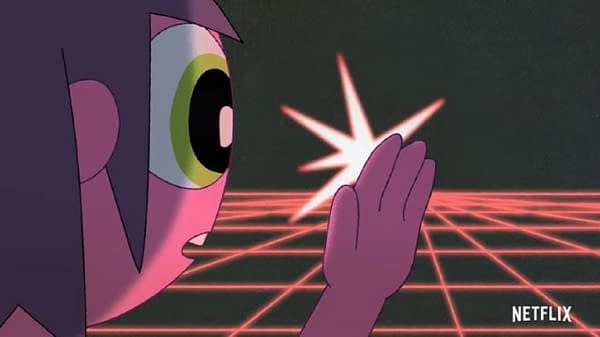
Duncan continued, "The best way to do it would be to start right here and look at what happens with every exhalation, and inhalation, and you'll find that it's just like this. For me, the way that I understand what happens after you die is when I wake up from a dream. I really don't think too much about that dream. I don't know about you if you ever had a significant dream where you were hanging out with someone very important to you and you wake up. I imagine it's more than likely this entire existence seems like that, like a kind of sweet dream that you had while you were laying in some field in infinity, staring up at the clouds, and that's pretty much it. (You) probably don't think about it too much after that."
For The Midnight Gospel, Music Is The Key
L.A. composer Joe Wong (Russian Doll, Superjail!) provides most of the soundtrack but Duncan, who describes music as "a fantastic way to plumb the depths of your own psyche," composed some of the music for the show, notably the end credit music. The reasons are obvious. Clancy is a reflection of, and to some degree is, Duncan. Clancy likes to make music, and synthesizers, messing around with gadgets and making sounds. So he would do that on Midnight Gospel, just like he did on The Duncan Trussell Family Hour: "I'm clearly not a professional musician but for me making music is a form of meditation, it's like a Rorschach inkblot test for wherever I happen to be on any given day. If my mind is scattered, or if I'm consumed by some worry, then the music seems to reflect that."
Like Thor charging Iron Man's suit, Trussell's infectious energy pulses thru the phone while he explains his connection to music: "Earlier we were talking about language, and like stream-of-consciousness articulation of wherever we happen to be but holy s*** isn't that a limited way of expressing ourselves to some degree? You have to smash your entire experience as a human being on the planet into guttural grunts, clicks, and whistles out of the thing you make you make hamburgers with. It's (language) like limiting, whereas with music, you know, it's universal. Anyone who can hear has the ability to understand even if it can't hear you can feel the vibrations of it, and so it's a transcendent mode of communication."
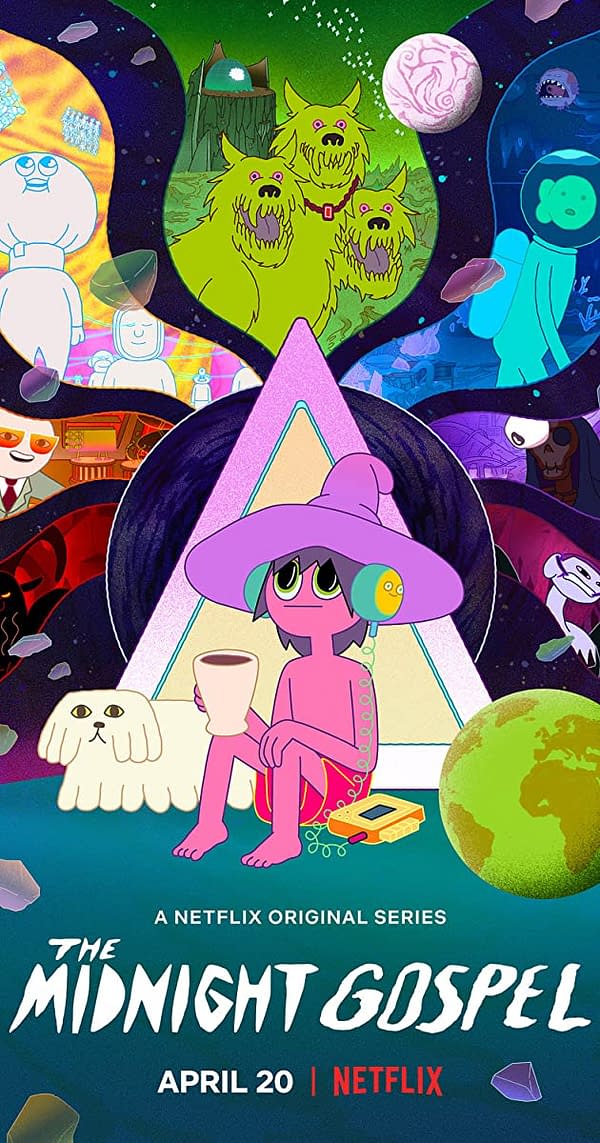
Trussell got his start in comedy answering phones at the Comedy Store, where he quickly moved up the ranks from answering the phones to comedy matriarch Mitzi Shore's delivery person/chauffeur. It wasn't the best job, picking up cow tongue sandwiches and driving around his comedy guru, but spending extra time with Mitzi would prove invaluable: "As you're driving her around, sure as shit, she would start telling me things, you know, and give you little lessons about comedy, about life. She would teach you and teach you in these crazy ways. I don't know I feel really lucky I got to hang out with her in that way." Duncan continues, "I've never met anyone who loved comedy the way she did. She loves comedy as though it were, she considered it to be the highest art form. She wasn't flippant about that at all. I remember she had on her wall, someone had crocheted for her, something that said 'Dying Is easy, Comedy is hard.' That was her thinking. She was one of a kind."
Trussell's Joe Rogan Experience Would Change His Life
Trussell continued to work his way up the ranks but ended up as a talent coordinator, which he tells me is a glorified assistant to Mitzi. Despite the warnings of his friends and other comedians that the job would ruin his chances at a career, he stuck with it. As the universe would have it Duncan began a phone relationship with Joe Rogan having the same conversations they have on the Joe Rogan Experience podcast now. Aliens, DMT, deprivation tanks, conspiracy theories, mushrooms, all convinced Joe to stick around on a Sunday night and watch Trussell's six-minute employee spot: "He saw me have a good set and then he started taking me on the road with him and that we're one thing led to another that's where I got my start. It all happened because I was the talent coordinator."
Rogen is known to be a mentor to a lot of comics and as we all know now, everything Rogan touches turns to gold: "He took me on the roadway before I ever should have been going on the road and didn't care what I did on stage as long as he saw that I was progressing, developing, taking it seriously, not fucking up the stage time or squandering it. Yeah, he helped a lot of it." Fortune favors the prepared, but Duncan is practically religious about his good luck and how it brought about The Midnight Gospel. He recalls after receiving an email from Ward, Duncan couldn't wrap his mind around the possibility that the creator of Adventure Time had listened to his podcast, and he was sure it was a troll: "So when I think of that, Wow, podcasting is like throwing messages, putting messages in a bottle and just throwing it out in the sea. And you'd never know who's going to write back or what bottles are going to wash up on shore or not only that which one of them. so yeah it's luck. it's gotta be. What else would you call it, grace? Divine intervention? I don't know, a simulator maybe? I don't know. When I was sitting in a writers room with Weird Al coming up with apocalypses it was really hard for me not to believe I was in a simulation."
Duncan further elaborated: "Yeah! (like) Dandelions in the wind. that's right you've got to put it out there, and realize that anything that comes after that is icing on the cake. The thing itself, the action itself is the real joy. For me, the podcast is just getting to sit down with people for an hour or two, and we have a conversation uninterrupted, like this, is really delightful and transformative. And so the fact the podcast actually made its way on to Netflix is astoundingly beautiful to me. where the rubber hits the road, so to speak, is the moment every week or I get to meet somebody that maybe I never met before, to end up teaching me something I never heard before. That's the real psychedelic, that's the real trip."
As for Duncan's hopes for what the viewers might take away from Midnight Gospel? "My hope would be that folks if you're going through stuff, and I think we're all going through something right now, you should get a little bit of, get a little bit of light. A little bit of good news. That's what gospel is." Duncan explains that sometimes through tragedy, a window to happiness can open, "Even though the apocalypse and disaster and catastrophe can be the loudest thing out there if you just listen a little closer you can tune into something that is so beautiful, and so untouched by the chaos it can really bring a lot of comfort to be quiet. so in some way it does that for people."
What better way to end our interview then with an essential quote from Deneen Fendig, with The Midnight Gospel currently streaming on Netflix: "I may leave this plane of existence sooner rather than later, but the love isn't going anywhere. / I am as certain of that as I am of anything. / I want to say that I will be with you in ways that neither you nor I can comprehend. / I'm spread out throughout the world. / Not by anything I'm doing, but I'm with you. / Just pay attention, listen for me. / I'm here. / I'm there."




